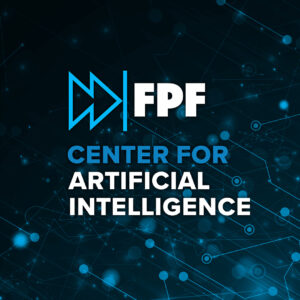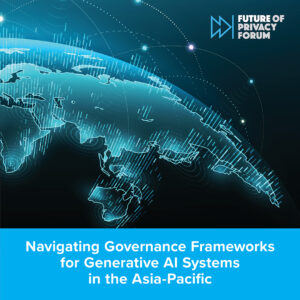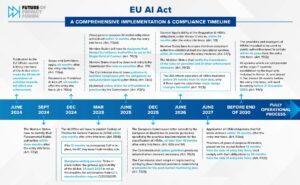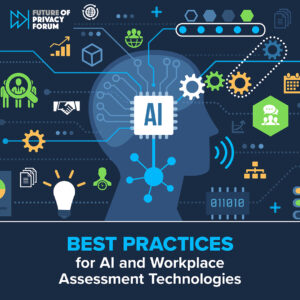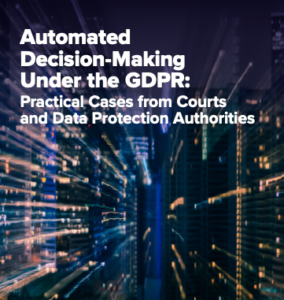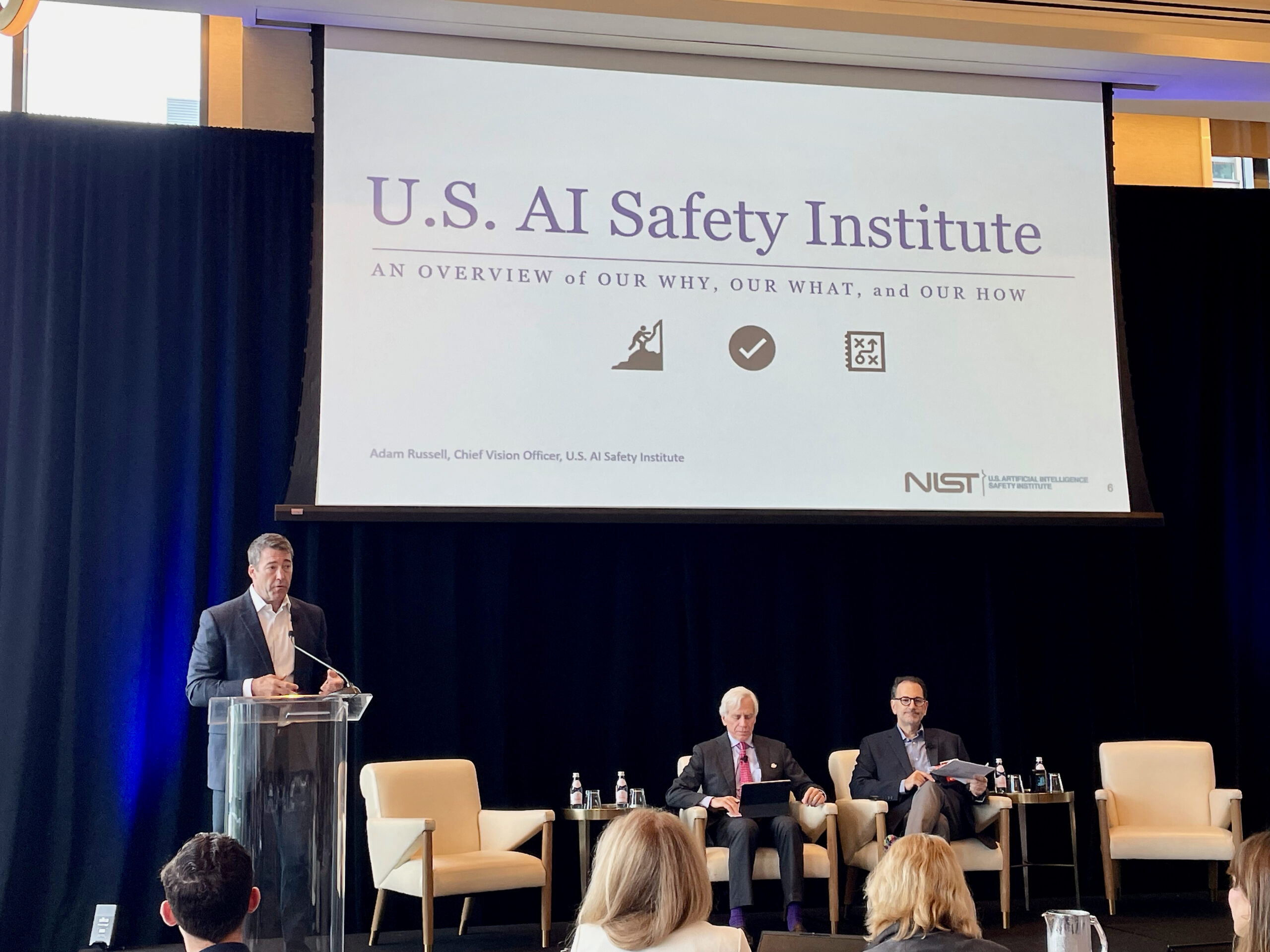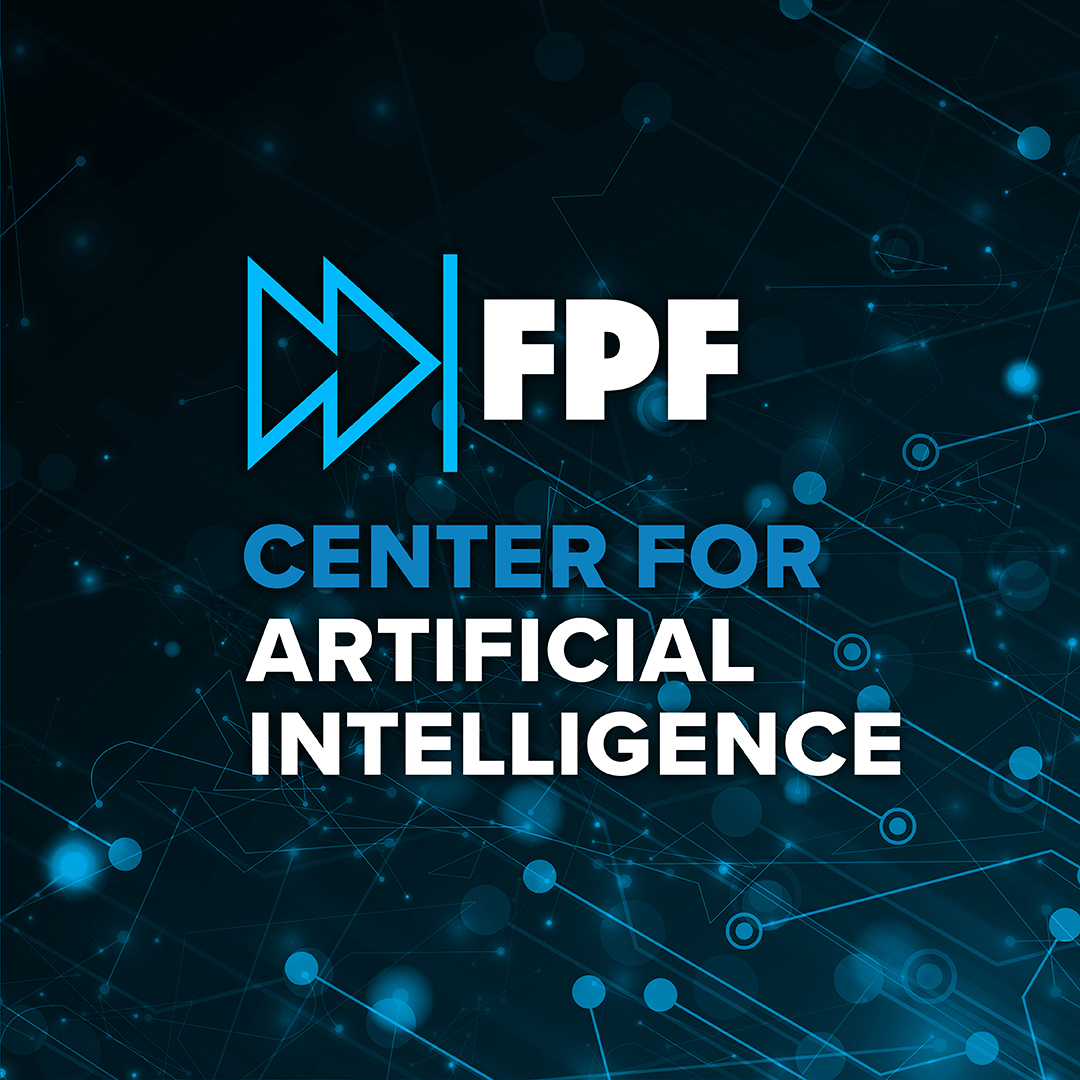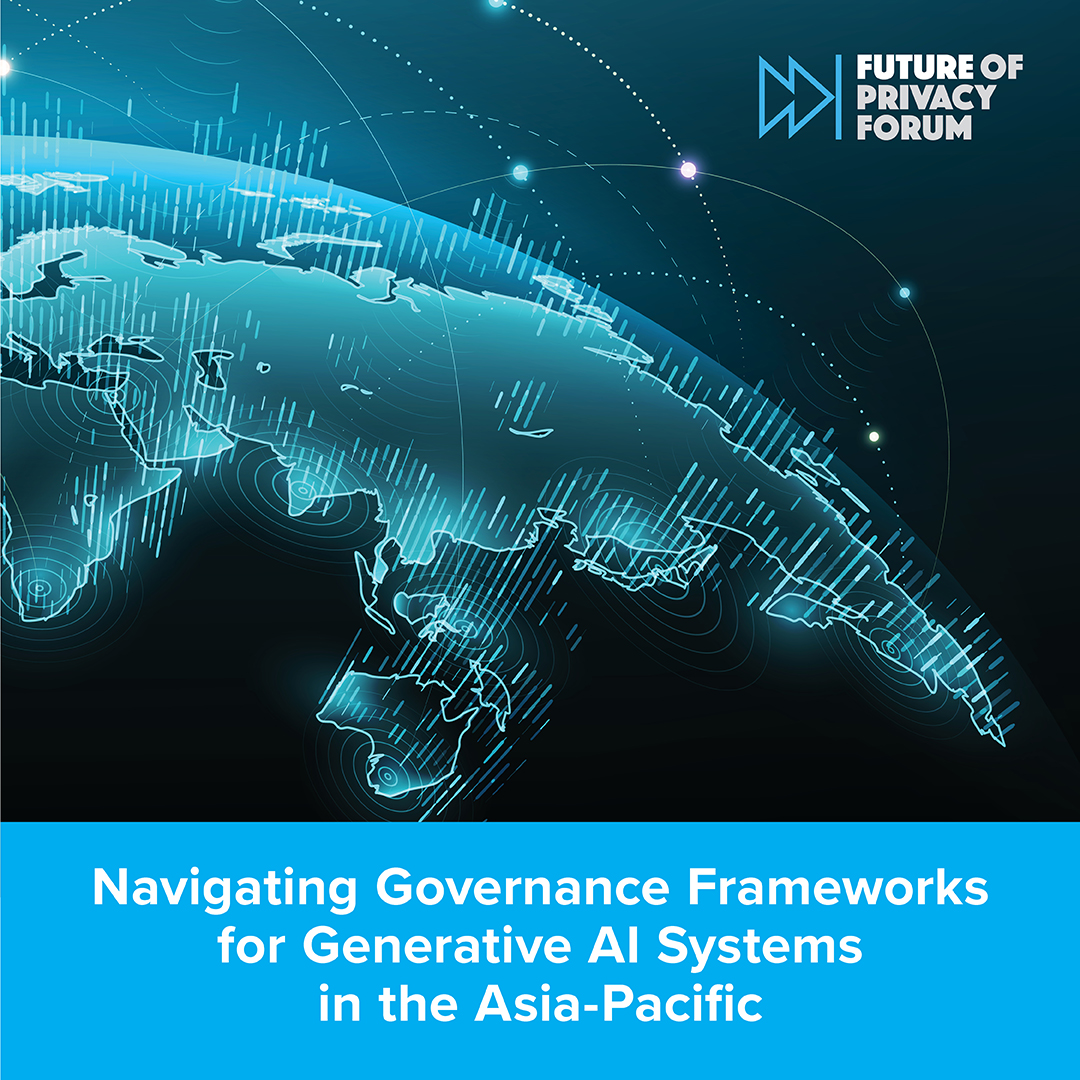The FPF Center for Artificial Intelligence: Navigating AI Policy, Regulation, and Governance
 The rapid deployment of Artificial Intelligence for consumer, enterprise, and government uses has created challenges for policymakers, compliance experts, and regulators. AI policy stakeholders are seeking sophisticated, practical policy information and analysis.
The rapid deployment of Artificial Intelligence for consumer, enterprise, and government uses has created challenges for policymakers, compliance experts, and regulators. AI policy stakeholders are seeking sophisticated, practical policy information and analysis.
This is where the FPF Center for Artificial Intelligence comes in, expanding FPF’s role as the leading pragmatic and trusted voice for those who seek impartial, practical analysis of the latest challenges for AI-related regulation, compliance, and ethical use.
At the FPF Center for Artificial Intelligence, we help policymakers and privacy experts at organizations, civil society, and academics navigate AI policy and governance. The Center is supported by a Leadership Council of experts from around the globe. The Council consists of members from industry, academia, civil society, and current and former policymakers.
FPF has a long history of AI-related and emerging technology policy work that has focussed on data, privacy, and the responsible use of technology to mitigate harms. From FPF’s presentation to global privacy regulators about emerging AI technologies and risks in 2017 to our briefing for US Congressional members detailing the risks and mitigation strategies for AI-powered workplace tech in 2023, FPF has helped policymakers around the world better understand AI risks and opportunities while equipping data, privacy and AI experts with the information they need to develop and deploy AI responsibly in their organizations.
In 2024, FPF received a grant from the National Science Foundation (NSF) to advance the Whitehouse Executive Order in Artificial Intelligence to support the use of Privacy Enhancing Technologies (PETs) by government agencies and the private sector by advancing legal certainty, standardization, and equitable uses. FPF is also a member of the U.S. AI Safety Institute at the National Institute for Standards and Technology (NIST) where it focuses on assessing the policy implications of the changing nature of artificial intelligence.
Areas of work within the FPF Center for Artificial Intelligence include:
- Legislative Comparison
- Responsible AI Governance
- AI Policy by Sector
- AI Assessments & Analyses
- Novel AI Policy Issues
- AI and Privacy Enhancing Technologies
FPF’s new Center for Artificial Intelligence will be supported by a Leadership Council of leading experts from around the globe. The Council will consist of members from industry, academia, civil society, and current and former policymakers.
FPF Center for AI Leadership Council
The FPF Center for Artificial Intelligence will be supported by a Leadership Council of leading experts from around the globe. The Council will consist of members from industry, academia, civil society, and current and former policymakers.
We are delighted to announce the founding Leadership Council members:
- Estela Aranha, Member of the United Nations High-level Advisory Body on AI; Former State Secretary for Digital Rights, Ministry of Justice and Public Security, Federal Government of Brazil
- Jocelyn Aqua, Principal, Data, Risk, Privacy and AI Governance, PricewaterhouseCoopers LLP
- John Bailey, Nonresident Senior Fellow, American Enterprise Institute
- Lori Baker, Vice President, Data Protection & Regulatory Compliance, Dubai International Financial Centre Authority (DPA)
- Cari Benn, Assistant Chief Privacy Officer, Microsoft Corporation
- Andrew Bloom, Vice President & Chief Privacy Officer, McGraw Hill
- Kate Charlet, Head of Global Privacy, Safety, and Security Policy, Google
- Prof. Simon Chesterman, David Marshall Professor of Law & Vice Provost, National University of Singapore; Principal Researcher, Office of the UNSG’s Envoy on Technology, High-Level Advisory Body on AI
- Barbara Cosgrove, Vice President, Chief Privacy Officer, Workday
- Jo Ann Davaris, Vice President, Global Privacy, Booking Holdings Inc.
- Elizabeth Denham, Chief Policy Strategist, Information Accountability Foundation, Former UK ICO Commissioner and British Columbia Privacy Commissioner
- Lydia F. de la Torre, Senior Lecturer at University of California, Davis; Founder, Golden Data Law, PBC; Former California Privacy Protection Agency Board Member
- Leigh Feldman, SVP, Chief Privacy Officer, Visa Inc.
- Lindsey Finch, Executive Vice President, Global Privacy & Product Legal, Salesforce
- Harvey Jang, Vice President, Chief Privacy Officer, Cisco Systems, Inc.
- Emerald de Leeuw-Goggin, Global Head of AI Governance & Privacy, Logitech
- Caroline Louveaux, Chief Privacy Officer, MasterCard
- Ewa Luger, Professor of human-data interaction, University of Edinburgh; Co-Director, Bridging Responsible AI Divides (BRAID)
- Dr. Gianclaudio Malgieri, Associate Professor of Law & Technology at eLaw, University of Leiden
- State Senator James Maroney, Connecticut
- Christina Montgomery, Chief Privacy & Trust Officer, AI Ethics Board Chair, IBM
- Carolyn Pfeiffer, Senior Director, Privacy, AI & Ethics and DSSPE Operations, Johnson & Johnson Innovative Medicine
- Ben Rossen, Associate General Counsel, AI Policy & Regulation, OpenAI
- Crystal Rugege, Managing Director, Centre for the Fourth Industrial Revolution Rwanda
- Guido Scorza, Member, The Italian Data Protection Authority
- Nubiaa Shabaka, Global Chief Privacy Officer and Chief Cyber Legal Officer, Adobe, Inc.
- Rob Sherman, Vice President and Deputy Chief Privacy Officer for Policy, Meta
- Dr. Anna Zeiter, Vice President & Chief Privacy Officer, Privacy, Data & AI Responsibility, eBay
- Yeong Zee Kin, Chief Executive of Singapore Academy of Law and former Assistant Chief Executive (Data Innovation and Protection Group), Infocomm Media Development Authority of Singapore
For more information on the FPF Center for AI email [email protected]
Featured
Connecting Experts to Make Privacy-Enhancing Tech and AI Work for Everyone
The Future of Privacy Forum (FPF) launched its Research Coordination Network (RCN) for Privacy-Preserving Data Sharing and Analytics on Tuesday, July 9th. The RCN supports the Biden-Harris Administration’s commitments to privacy, equity, and safety articulated in the administration’s Executive Order on Artificial Intelligence (AI). Industry experts, policymakers, civil society, and academics met to discuss the […]
NEW FPF REPORT: Confidential Computing and Privacy: Policy Implications of Trusted Execution Environments
Written by Judy Wang, FPF Communications Intern Today, the Future of Privacy Forum (FPF) published a paper on confidential computing, a privacy-enhancing technology (PET) that marks a significant shift in the trustworthiness and verifiability of data processing for the use cases it supports, including training and use of AI models. Confidential computing leverages two key […]
A First for AI: A Close Look at The Colorado AI Act
Colorado made history on May 17, 2024 when Governor Polis signed into law the Colorado Artificial Intelligence Act (“CAIA”), the first law in the United States to comprehensively regulate the development and deployment of high-risk artificial intelligence (“AI”) systems. The law will come into effect on February 1, 2026, preceding the March, 2026 effective date […]
FPF Launches Effort to Advance Privacy-Enhancing Technologies in Support of AI Executive Order, Convenes Experts, and Meets With White House
FPF’s Research Coordination Network will support developing and deploying Privacy-Enhancing Technologies (PETs) for socially beneficial data sharing and analytics. JULY 9, 2024 — Today, the Future of Privacy Forum (FPF) is launching the Privacy-Enhancing Technologies (PETs) Research Coordination Network (RCN) with a virtual convening of diverse experts alongside a high-level, in-person workshop with key stakeholders […]
Chevron Decision Will Impact Privacy and AI Regulations
The Supreme Court has issued a 6-3 decision in two long-awaited cases – Loper Bright Enterprises v. Raimondo and Relentless, Inc. v. Department of Commerce – overturning the legal doctrine of “Chevron deference.” While the decision will impact a wide range of federal rules, it is particularly salient for ongoing privacy, data protection, and artificial […]
AI Forward: FPF’s Annual DC Privacy Forum Explores Intersection of Privacy and AI
The Future of Privacy Forum (FPF) hosted its inaugural DC Privacy Forum: AI Forward on Wednesday, June 5th. Industry experts, policymakers, civil society, and academics explored the intersection of data, privacy, and AI. In Washington, DC’s southwest Waterfront at the InterContinental, participants joined in person for a full-day program consisting of keynote panels, AI talks, […]
The World’s First Binding Treaty on Artificial Intelligence, Human Rights, Democracy, and the Rule of Law: Regulation of AI in Broad Strokes
The Council of Europe’s (CoE) Framework Convention on Artificial Intelligence and Human Rights, Democracy, and the Rule of Law (Framework Convention on AI) was adopted on 17 May 2024, after two years of drafting and negotiation. This is the world’s first binding treaty on AI, focusing on protecting human rights, democracy and the rule of […]
Newly Updated Guidance: FPF Releases Updates to the Generative AI Internal Policy Considerations Resource to Provide New Key Lessons For Practitioners
Today, the Future of Privacy Forum (FPF) Center for Artificial Intelligence is releasing a newly updated version of our Generative AI internal compliance document – Generative AI for Organizational Use: Internal Policy Considerations, with new content addressing organizations’ ongoing responsibilities, specific concerns (e.g., high-risk uses), and lessons taken from recent regulatory enforcement related to these technologies. […]
Future of Privacy Forum Launches the FPF Center for Artificial Intelligence
The FPF Center for Artificial Intelligence will serve as a catalyst for AI policy and compliance leadership globally, advancing responsible data and AI practices for public and private stakeholders Today, the Future of Privacy Forum (FPF) launched the FPF Center for Artificial Intelligence, established to better serve policymakers, companies, non-profit organizations, civil society, and academics […]
New Report Examines Generative AI Governance Frameworks Across the Asia-Pacific Region
May 23, 2024 — Future of Privacy Forum today announced the launch of a comprehensive report, “Navigating Governance Frameworks for Generative AI Systems in the Asia-Pacific.” This report examines the current state of governance frameworks for generative AI systems in five countries in the Asia-Pacific (APAC) region: Australia, China, Japan, Singapore, and South Korea. The […]

